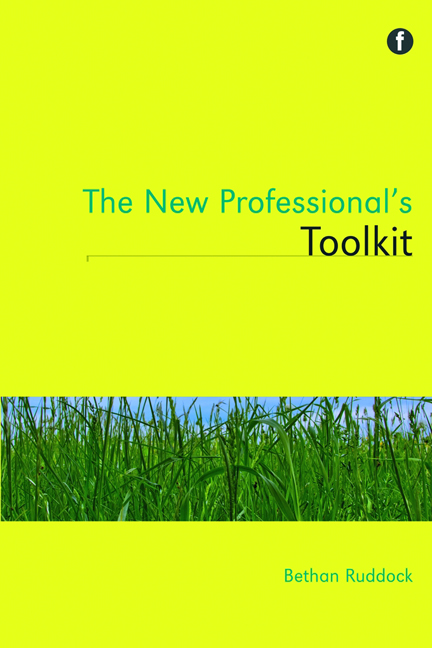Book contents
- Frontmatter
- Dedication
- Contents
- Preface
- Acknowledgements
- Glossary
- Introduction
- 1 Project management
- 2 Teaching, training and communicating
- 3 Meeting your users' needs and measuring success
- 4 Marketing your service and engaging stakeholders
- 5 Using technologies
- 6 Getting and staying online
- 7 Generating funding and doing more with less
- 8 Managing money, budgets and negotiating
- 9 Information ethics and copyright
- 10 Upskilling and professional development
- 11 Networking and promoting yourself
- 12 Professional involvement and career development
- Conclusion
- Appendix: Budgeting example spreadsheet
- Index
- Frontmatter
- Dedication
- Contents
- Preface
- Acknowledgements
- Glossary
- Introduction
- 1 Project management
- 2 Teaching, training and communicating
- 3 Meeting your users' needs and measuring success
- 4 Marketing your service and engaging stakeholders
- 5 Using technologies
- 6 Getting and staying online
- 7 Generating funding and doing more with less
- 8 Managing money, budgets and negotiating
- 9 Information ethics and copyright
- 10 Upskilling and professional development
- 11 Networking and promoting yourself
- 12 Professional involvement and career development
- Conclusion
- Appendix: Budgeting example spreadsheet
- Index
Summary
Introduction
It is likely that one of the first things you do in a new professional role is to get involved with project management. Perhaps your workplace is running a project your managers would like you to get involved with, or someone has asked you to manage a small-scale project. You might be specifically employed to do project work – there are frequently project-based roles in library and information science (LIS), which may appeal especially to early career professionals. These roles frequently have short-term contracts (of a year or less), and allow you to gain experience in different areas of LIS work. There may also be the chance to turn a project position into a permanent role with your employer. Your project involvement might be:
• managing a project that you are undertaking
• working as one of a team on a project someone else is managing
• managing a project that a team is working on.
These projects might be formal or informal, work-based or external. Allan (2004, 6) classifies projects into the following categories:
• strategic or operational
• simple or complex
• local or distributed
• having ‘hard’ or ‘soft’ outcomes
• fixed or changing the environment.
Whatever the type of project, they will all have certain things in common.
What is a project?
A project is a task, which has the following characteristics:
• start and end dates: so it is completed within a certain time span, defined in advance
• measurable goals and outcomes: what the project is to achieve
• a budget: with an allocation of resources, including money, time and staff.
The success of a project is measured by these characteristics: a successful project is one that is completed on time, within budget, and achieves its goals.
Project work frequently requires you to collaborate across departments and disciplines. While projects might just involve library or archive staff, it is more likely that they will also require the involvement of other departments, such as finance, information technology (IT) and human resources. The ability to liaise with staff from different departments is a core skill required for project work.
Although projects can be large and complex, they can also be small-scale and relatively simple.
- Type
- Chapter
- Information
- The New Professional's Toolkit , pp. 1 - 14Publisher: FacetPrint publication year: 2012



